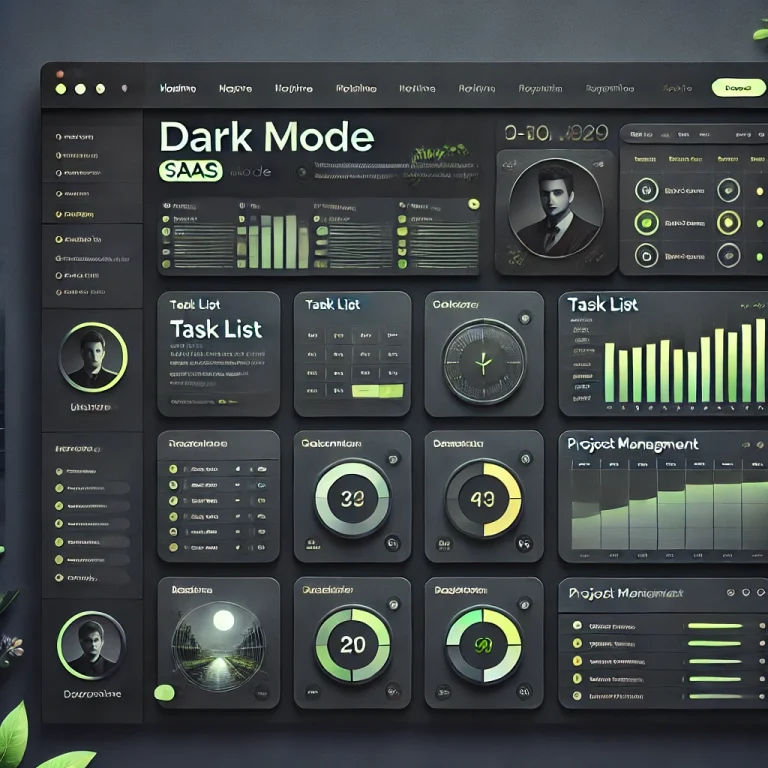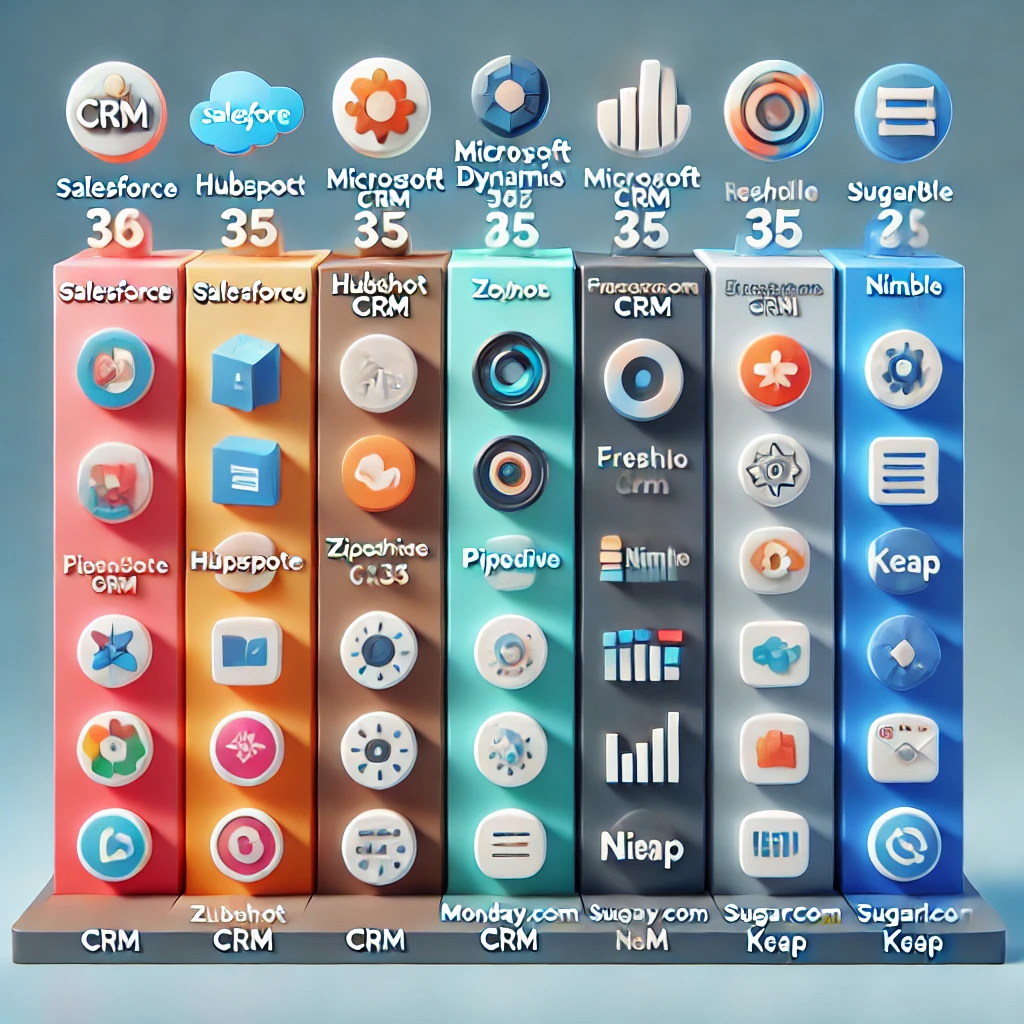
Top 20 Best CRM Software in 2024-2025: A Detailed Analysis
Customer Relationship Management (CRM) software is an indispensable tool for businesses aiming to enhance customer engagement, streamline operations, and boost overall productivity. With the variety of CRMs available, it can be overwhelming to choose the right one for your business. Here, we provide an in-depth exploration of the top 20 best CRM software for 2024-2025 to help you make an informed decision.
Affiliate Disclosure
This article may contain affiliate links, which means we may earn a commission if you make a purchase or sign up for a service through one of our links. This comes at no additional cost to you and helps support the maintenance and creation of valuable content on this website.
We only recommend products and services that we genuinely believe will bring value to our readers. Our opinions and recommendations are unbiased and based on thorough research and expertise. Thank you for supporting us!
Table of Contents
- Introduction
- Why Businesses Need CRM Software
- Detailed Analysis of the Top 20 Best CRM Software
- Salesforce
- HubSpot CRM
- Zoho CRM
- Microsoft Dynamics 365
- Pipedrive
- Freshsales
- Monday.com CRM
- SugarCRM
- Nimble
- Keap
- Insightly
- Apptivo
- Oracle CRM
- Creatio
- Salesflare
- Capsule CRM
- Copper CRM
- Agile CRM
- NetSuite CRM
- SAP CRM
- How to Choose the Best CRM for Your Business
- Conclusion
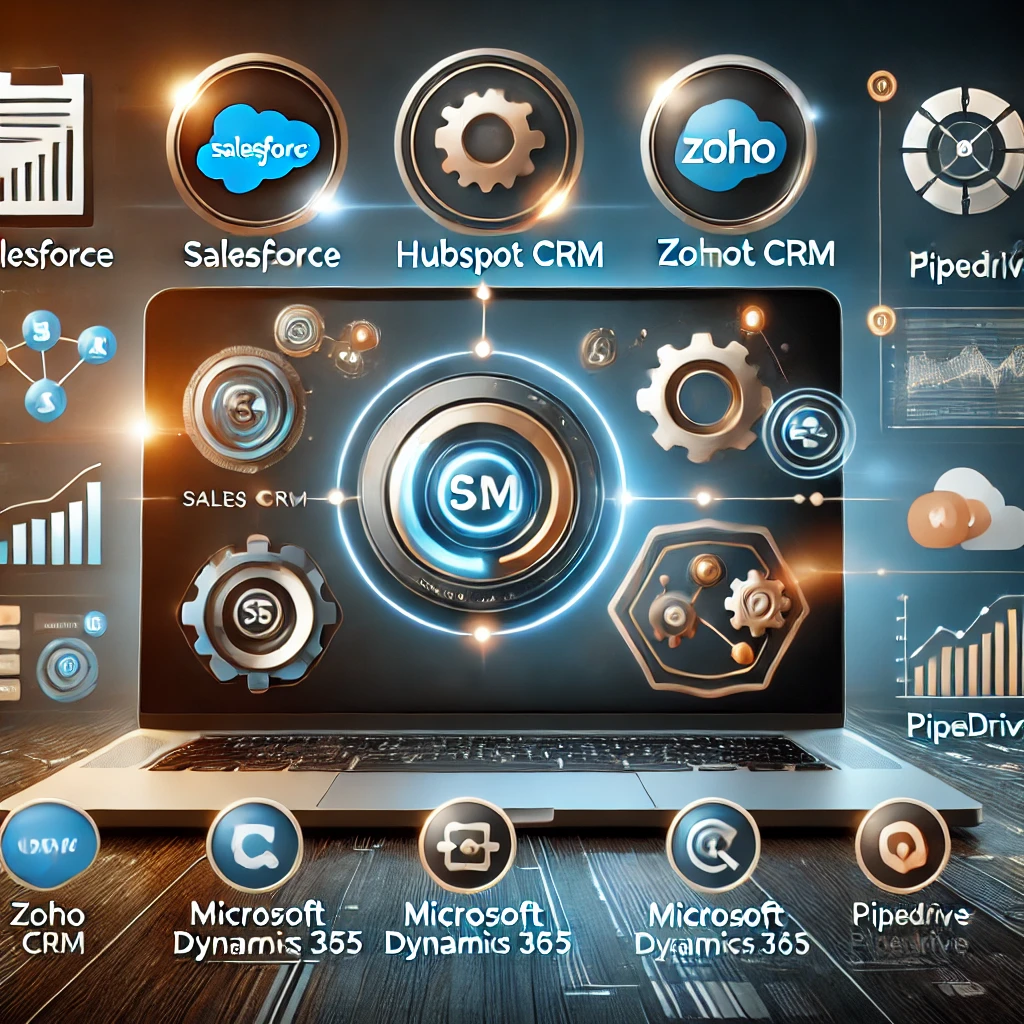
Why Businesses Need CRM Software
The best CRM software does more than store customer data; it empowers teams to build meaningful relationships, automate tedious tasks, and gain insights into customer behavior. Here are key reasons businesses use CRM software:
- Centralized Data Management: Consolidates customer interactions in one place for better team collaboration.
- Automation: Streamlines repetitive tasks like email follow-ups and report generation.
- Analytics and Reporting: Offers actionable insights into sales performance and customer trends.
- Scalability: Supports business growth with advanced features and integrations.
- Improved Customer Retention: Enables personalized communication and proactive support.
Detailed Analysis of the Top 20 Best CRM Software
1. Salesforce
- Overview: Salesforce continues to dominate the CRM market with its powerful features and vast ecosystem.
- Strengths:
- Customizable dashboards and workflows.
- AI-powered Einstein Analytics for predictive insights.
- Extensive integration options via AppExchange.
- Ideal For: Enterprises and businesses requiring robust solutions.

2. HubSpot CRM
- Overview: HubSpot CRM is a top choice for startups and SMBs, offering a free version with essential features.
- Strengths:
- Easy-to-use interface with a focus on inbound marketing.
- Integrated email tracking and lead generation tools.
- Scalable pricing plans.
- Ideal For: Small businesses and teams new to CRM.
3. Zoho CRM
- Overview: Known for affordability and AI-driven automation, Zoho CRM is a versatile option.
- Strengths:
- Multi-channel communication and robust automation.
- Customizable to fit industry-specific needs.
- Affordable pricing tiers.
- Ideal For: Budget-conscious businesses.
4. Microsoft Dynamics 365
- Overview: A comprehensive solution that combines CRM and ERP capabilities.
- Strengths:
- Seamless integration with Microsoft tools like Office 365.
- AI-driven insights and analytics.
- Modular approach to choose only what you need.
- Ideal For: Large organizations and enterprises.
5. Pipedrive
- Overview: A sales-focused CRM with an emphasis on pipeline management.
- Strengths:
- User-friendly visual pipelines.
- Highly customizable sales workflows.
- Affordable pricing for SMBs.
- Ideal For: Sales teams and small businesses.
Top 20 Best CRM Software
6. Freshsales
- Overview: Part of the Freshworks suite, Freshsales simplifies sales processes with AI capabilities.
- Strengths:
- AI-powered lead scoring.
- Integrated phone and email communication.
- Affordable and scalable.
- Ideal For: Growing businesses seeking automation.
7. Monday.com CRM
- Overview: A highly visual CRM built on Monday.com’s work management platform.
- Strengths:
- Drag-and-drop interface for easy customization.
- Team collaboration tools.
- Integrations with popular tools like Slack and Google Workspace.
- Ideal For: Teams looking for collaborative project management and CRM in one.
8. SugarCRM
- Overview: SugarCRM focuses on automating workflows and providing in-depth customer insights.
- Strengths:
- Powerful automation features.
- Detailed analytics and reporting.
- Flexible deployment options (cloud or on-premise).
- Ideal For: Mid-sized to large businesses.
9. Nimble
- Overview: A lightweight CRM designed for small teams and solopreneurs.
- Strengths:
- Social media integration for enriched customer profiles.
- Simplified interface with core CRM features.
- Affordable pricing.
- Ideal For: Freelancers and small teams.
10. Keap (formerly Infusionsoft)
- Overview: A CRM tailored for small businesses with marketing automation capabilities.
- Strengths:
- Email and SMS marketing automation.
- Easy-to-use templates for campaigns.
- Comprehensive sales and payment tracking.
- Ideal For: Small businesses and startups.
Top 20 Best CRM Software
11. Insightly
- Overview: A CRM that combines project management and sales tools.
- Strengths:
- Project tracking features.
- Integration with G Suite and Office 365.
- Strong focus on data visualization.
- Ideal For: Teams needing CRM and project management in one tool.
12. Apptivo
- Overview: A cost-effective CRM with modules for sales, marketing, and support.
- Strengths:
- Modular pricing plans.
- User-friendly interface.
- Integration with major tools like PayPal and G Suite.
- Ideal For: Small businesses on a budget.
13. Oracle CRM
- Overview: Oracle’s CRM offering is geared toward enterprises seeking advanced features.
- Strengths:
- Robust AI-powered insights.
- Industry-specific solutions.
- Comprehensive analytics and reporting.
- Ideal For: Enterprises and large-scale businesses.
14. Creatio
- Overview: A no-code CRM for businesses needing highly customizable workflows.
- Strengths:
- Drag-and-drop interface for workflow creation.
- AI-driven process automation.
- Flexible deployment options.
- Ideal For: Businesses with complex processes.
15. Salesflare
- Overview: A CRM focused on automating data entry and lead management.
- Strengths:
- Automatically gathers customer data from various sources.
- Intuitive user interface.
- Affordable for small teams.
- Ideal For: Small sales teams.
16. Capsule CRM
- Overview: A simple and effective CRM for managing customer relationships.
- Strengths:
- Easy-to-use interface.
- Lightweight features ideal for small teams.
- Affordable pricing plans.
- Ideal For: Freelancers and small businesses.
17. Copper CRM
- Overview: A CRM built specifically for Google Workspace users.
- Strengths:
- Deep integration with Gmail and Google Calendar.
- Automated data capture.
- Streamlined interface for minimal disruptions.
- Ideal For: Teams using Google Workspace.
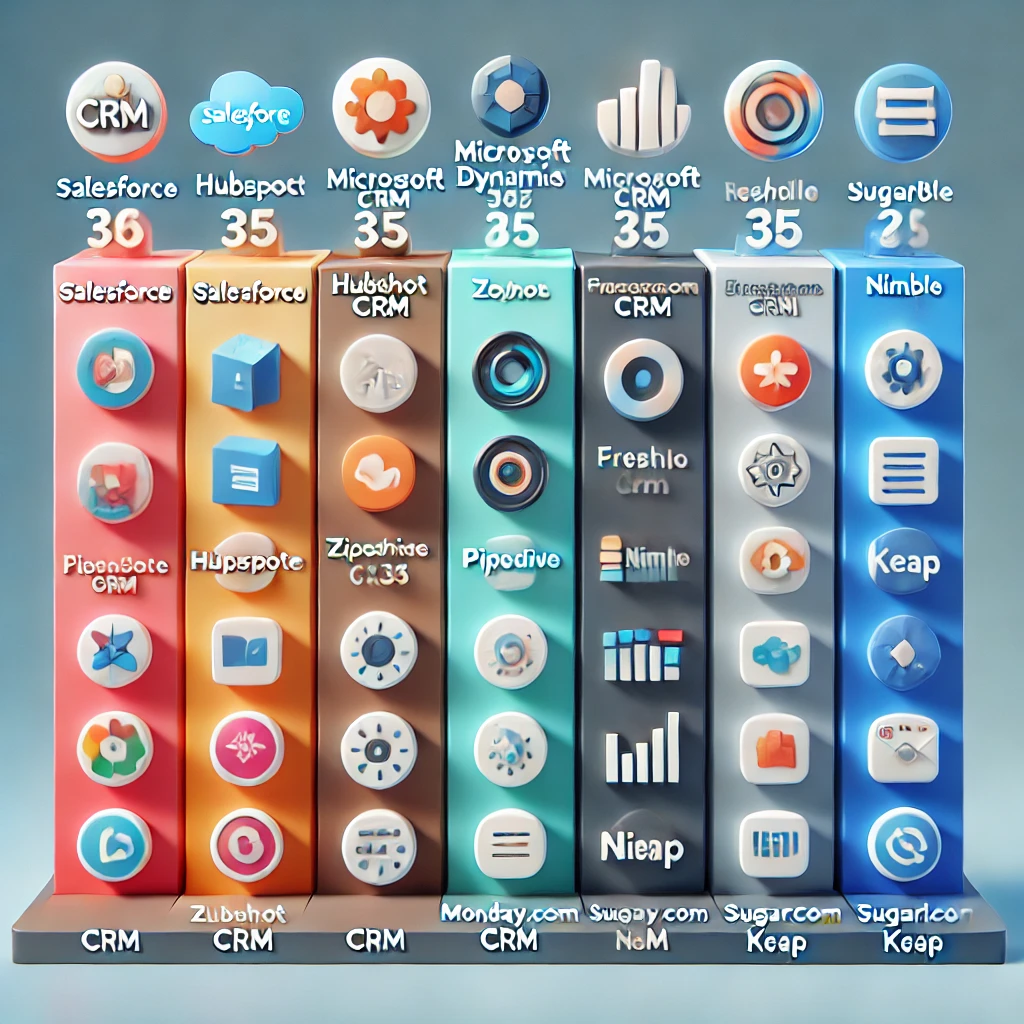
Top 20 Best CRM Software
18. Agile CRM
- Overview: A CRM combining sales, marketing, and customer service tools.
- Strengths:
- Affordable all-in-one platform.
- Marketing automation and landing page builder.
- Multi-channel support.
- Ideal For: SMBs looking for a complete CRM solution.
19. NetSuite CRM
- Overview: A cloud-based CRM from Oracle designed for scalability.
- Strengths:
- Real-time dashboards.
- Integration with ERP and e-commerce platforms.
- Advanced reporting capabilities.
- Ideal For: Growing businesses and enterprises.
20. SAP CRM
- Overview: SAP’s CRM offers enterprise-grade features with a focus on scalability.
- Strengths:
- AI-driven insights for customer engagement.
- Industry-specific solutions.
- Integration with SAP’s ERP system.
- Ideal For: Large businesses and enterprises.
Affiliate Disclosure
This article may contain affiliate links, which means we may earn a commission if you make a purchase or sign up for a service through one of our links. This comes at no additional cost to you and helps support the maintenance and creation of valuable content on this website.
We only recommend products and services that we genuinely believe will bring value to our readers. Our opinions and recommendations are unbiased and based on thorough research and expertise. Thank you for supporting us!
How to Choose the Best CRM for Your Business
To select the best CRM software, consider the following:
- Business Size and Industry: Match the CRM’s features to your specific needs.
- Ease of Use: Ensure the CRM is user-friendly to maximize adoption.
- Customization Options: Look for tools that adapt to your workflows.
- Integration Capabilities: Choose a CRM that connects seamlessly with your existing tools.
- Scalability: Select a CRM that can grow with your business.
Top 20 Best CRM Software
From comprehensive solutions like Salesforce and Microsoft Dynamics 365 to niche options like Nimble and Capsule CRM, the best CRM software for 2024-2025 caters to various business needs. Assess your requirements, budget, and team preferences to find the perfect fit for your organization. By investing in the right CRM, you can streamline operations, improve customer relationships, and drive long-term success.
A Comprehensive Guide to CRM Software: Why It’s Essential for Modern Businesses
Customer Relationship Management (CRM) software is more than just a tool; it’s a cornerstone of success for businesses aiming to improve customer interactions, streamline operations, and maximize sales performance. In this in-depth guide, we will explore what CRM software is, its importance, features, and how it can revolutionize businesses of all sizes. If you’re searching for insights about CRM tools, you’re in the right place.
What is CRM Software?
CRM software is a system that helps businesses manage relationships with current and potential customers. It acts as a centralized hub where companies store, analyze, and leverage customer data to build meaningful connections, increase retention, and optimize the customer journey.
From tracking interactions to automating marketing campaigns, CRM software is designed to improve communication, foster collaboration, and provide actionable insights that enhance decision-making processes.
Why is CRM Software Important?
The adoption of CRM software is essential for businesses in today’s customer-centric world. Here’s why:
1. Enhanced Customer Relationships
CRM software allows companies to maintain detailed records of customer interactions, preferences, and behaviors. With this data, businesses can deliver personalized experiences that improve satisfaction and loyalty.
2. Improved Efficiency
By automating routine tasks like follow-ups, lead scoring, and reporting, CRM tools free up time for teams to focus on strategic activities.
3. Data-Driven Insights
CRM platforms provide detailed analytics that helps businesses understand customer trends, identify opportunities, and predict future behaviors.
4. Collaboration Across Teams
Centralized customer data ensures that sales, marketing, and support teams are aligned, fostering better collaboration and a unified approach to customer engagement.
5. Scalability
Whether you're a startup or an enterprise, CRM software scales with your growth, adding features and integrations as your needs evolve.
Top 20 Best CRM Software
Core Features of CRM Software
When evaluating CRM software, it’s essential to look for features that align with your business objectives. Here are the core features that most CRMs offer:
1. Contact Management
Store and manage customer data, including names, emails, phone numbers, and interaction histories, in one centralized database.
2. Sales Pipeline Management
Track the progress of deals through customizable pipelines, helping sales teams prioritize leads and close deals faster.
3. Automation
Automate repetitive tasks such as email campaigns, lead scoring, and follow-up reminders to save time and reduce manual errors.
4. Reporting and Analytics
Generate detailed reports on sales performance, customer behaviors, and campaign effectiveness to make data-driven decisions.
5. Integrations
Seamlessly connect with third-party tools like email platforms, marketing software, and accounting systems to streamline workflows.
6. Mobile Accessibility
Access CRM tools on-the-go through mobile apps, ensuring productivity anytime, anywhere.
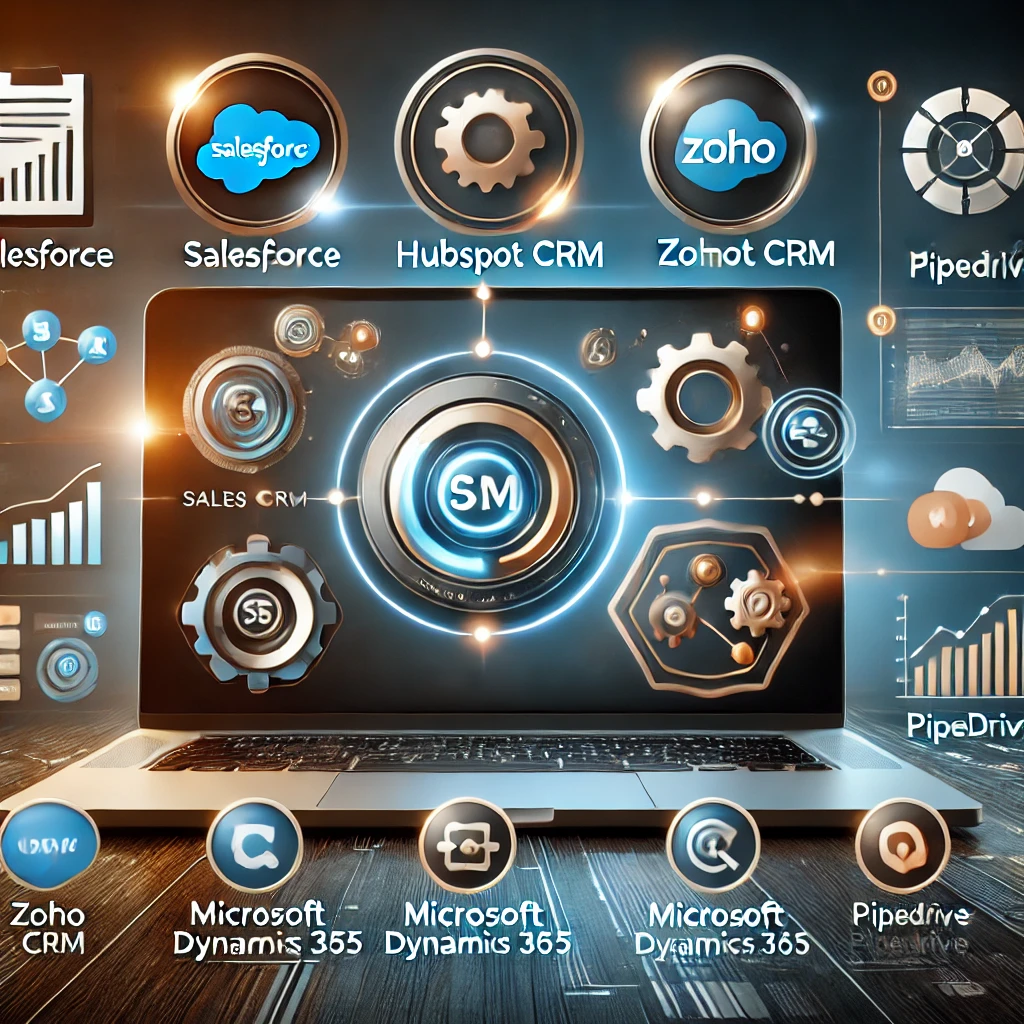
Types of CRM Software
CRM software can be categorized into three main types, each catering to specific business needs:
1. Operational CRM
Focuses on streamlining business processes, including sales, marketing, and customer service automation. Ideal for businesses looking to improve efficiency.
2. Analytical CRM
Helps organizations analyze customer data to identify trends and make informed decisions. Perfect for businesses that rely heavily on data for strategic planning.
3. Collaborative CRM
Enables cross-department collaboration by sharing customer information across sales, marketing, and support teams.
How CRM Software Helps Different Business Functions
CRM software isn’t just for sales teams; it benefits various departments within an organization:
1. Sales Teams
- Manage leads, track deals, and optimize sales pipelines.
- Forecast revenue and set achievable sales goals.
2. Marketing Teams
- Automate email campaigns and track their performance.
- Segment customers for targeted marketing efforts.
3. Customer Support Teams
- Track support tickets and manage resolutions efficiently.
- Build a knowledge base for faster issue resolution.
4. Management
- Gain visibility into team performance through dashboards.
- Make strategic decisions based on analytics and insights.
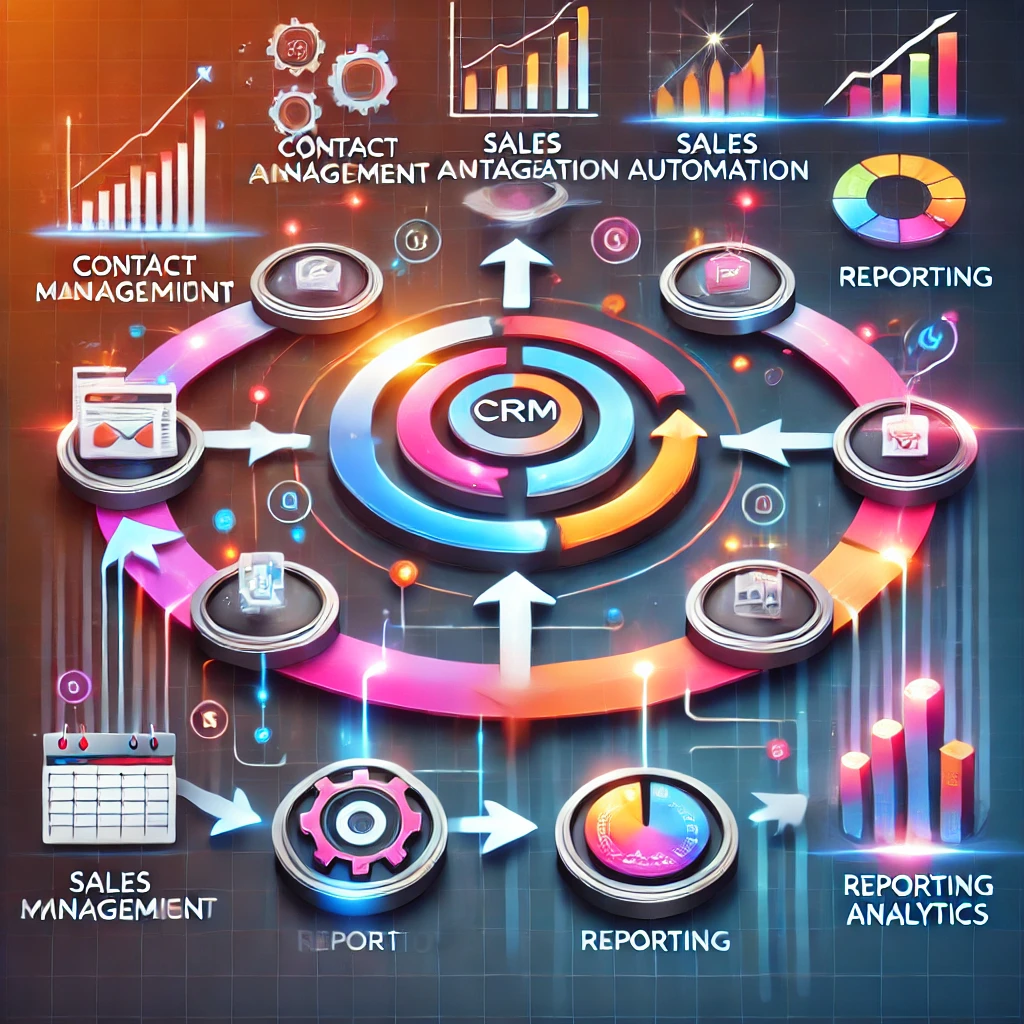
Top CRM Software Trends in 2024-2025
The CRM industry continues to evolve with technological advancements. Here are the key trends to watch:
1. AI-Powered CRMs
AI is transforming CRM software with features like predictive analytics, natural language processing, and smart recommendations.
2. Mobile-First CRM
With the rise of remote work, mobile CRM tools are gaining popularity, allowing teams to stay productive on the go.
3. Customizable Workflows
Businesses demand greater flexibility, prompting CRMs to offer drag-and-drop workflow builders for easy customization.
4. Social CRM
Integrating social media platforms into CRM systems helps businesses engage with customers on channels they prefer.
5. Data Privacy Compliance
As regulations like GDPR and CCPA become stricter, CRM tools now include features to ensure compliance with data protection laws.
Benefits of Cloud-Based CRM Software
Many businesses are transitioning to cloud-based CRM software due to its numerous advantages:
1. Accessibility
Cloud-based CRMs can be accessed from anywhere, enabling remote work and collaboration.
2. Cost-Effective
With no need for on-premise infrastructure, cloud CRMs reduce setup and maintenance costs.
3. Automatic Updates
Stay up-to-date with the latest features without manual upgrades.
4. Scalability
Easily scale up or down based on your business needs.
Tips for Successfully Implementing CRM Software
Implementing CRM software can be challenging without proper planning. Follow these tips for a smooth transition:
- Define Clear Objectives: Identify what you aim to achieve with the CRM, such as increasing sales or improving customer retention.
- Choose the Right CRM: Select a tool that aligns with your goals, budget, and team needs.
- Provide Training: Ensure all team members understand how to use the CRM effectively.
- Migrate Data Carefully: Transfer customer data accurately to avoid discrepancies.
- Monitor and Optimize: Regularly review CRM usage and make adjustments to workflows as needed.
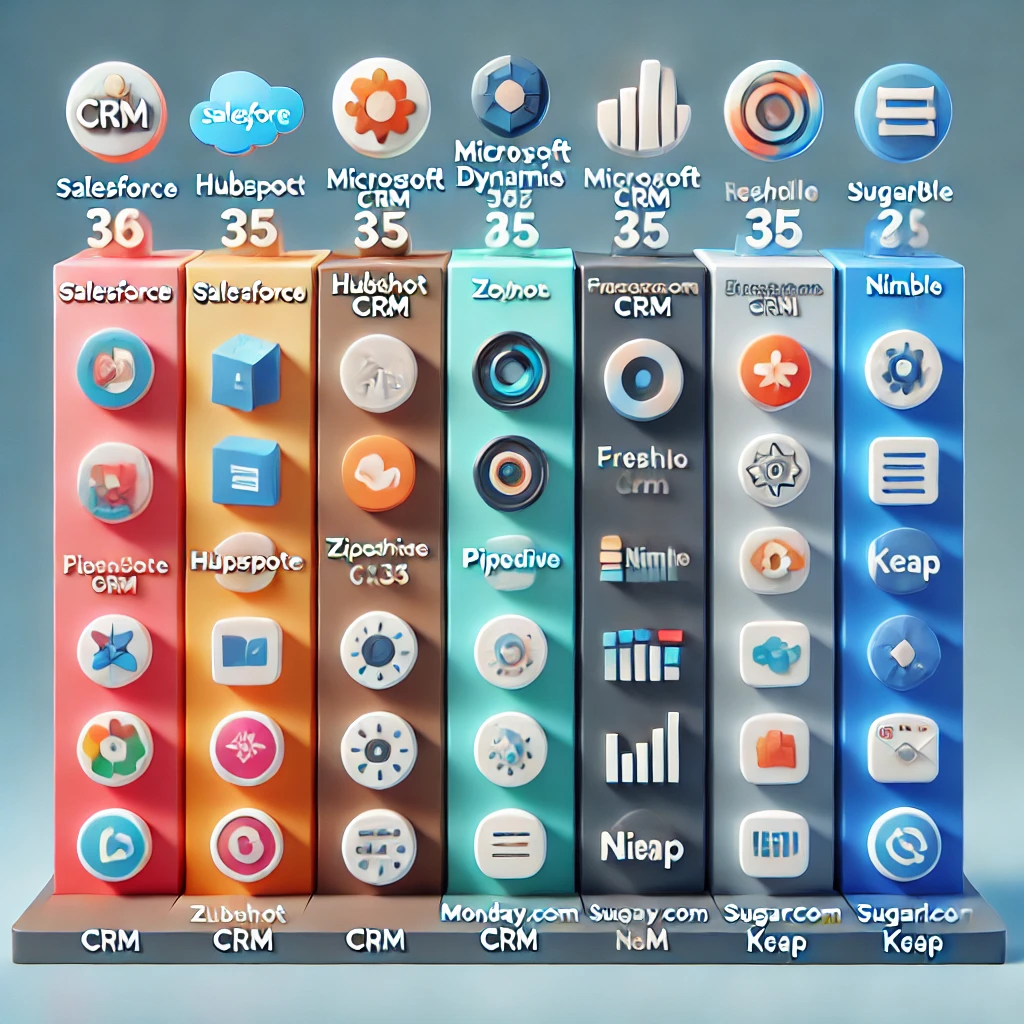
How CRM Software Drives ROI
Investing in CRM software pays off by delivering measurable returns:
- Improved Customer Retention: Personalized experiences and proactive support boost loyalty.
- Increased Sales Efficiency: Sales teams spend less time on administrative tasks and more on closing deals.
- Better Marketing Campaigns: Data-driven insights help create targeted campaigns that yield higher conversions.
- Cost Savings: Automation reduces the need for manual labor, cutting operational costs.
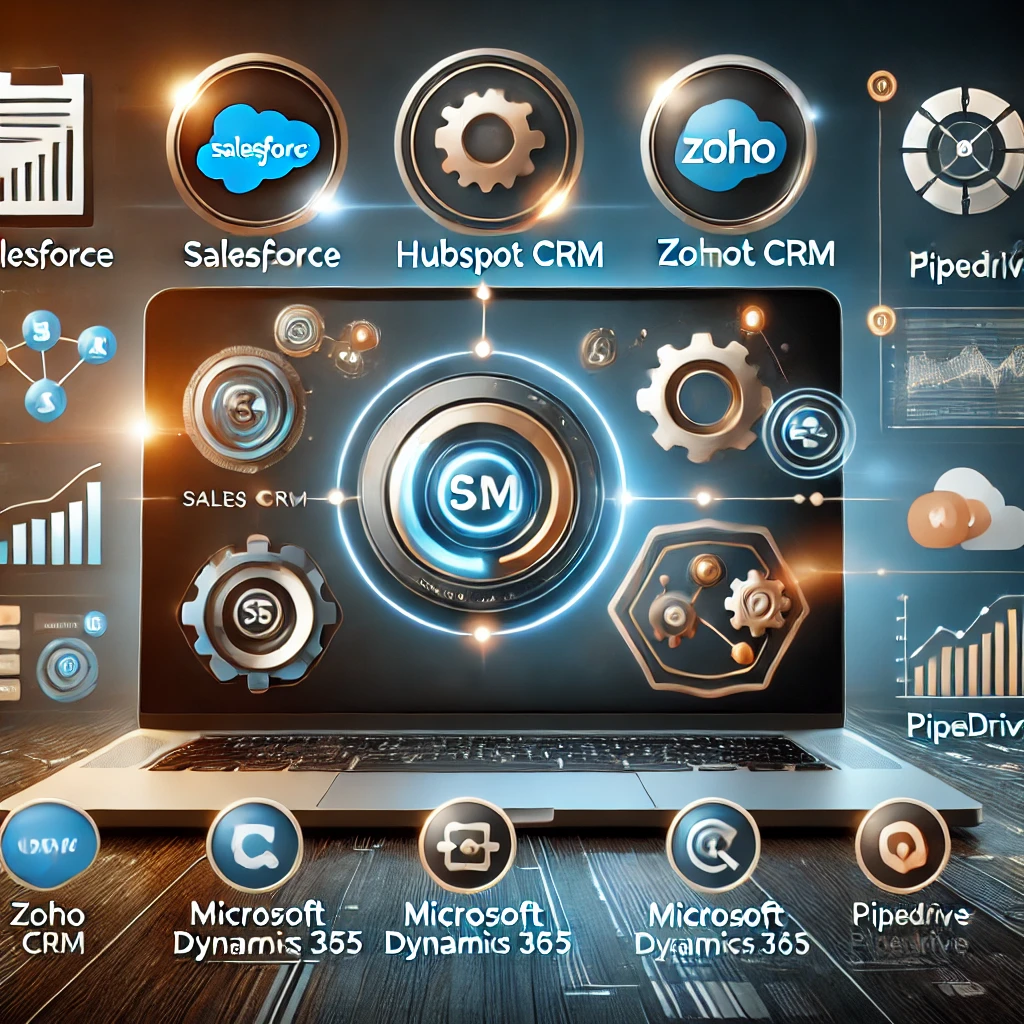
Future of CRM Software
The future of CRM software is exciting, with advancements like AI, IoT integration, and enhanced customer data security. Businesses can expect tools that are more intuitive, predictive, and capable of handling complex customer interactions with ease.
Best CRM software
CRM software is no longer optional in today’s competitive market; it’s a necessity for building and maintaining strong customer relationships. Whether you’re a small business or an enterprise, investing in the right CRM can drive efficiency, enhance customer satisfaction, and boost revenue.
By understanding the types, features, and benefits of CRM software, you can select a solution that aligns with your goals and sets your business up for long-term success.
The CRM software I recommend depends on your specific business needs, but HubSpot CRM and Salesforce are excellent options for most scenarios. Here's why:
1. HubSpot CRM (Recommended for Small to Medium-Sized Businesses)
- Why Choose HubSpot CRM?
- Free Plan: Offers a robust free version, perfect for small businesses or those new to CRM.
- Ease of Use: Intuitive interface and simple setup.
- Inbound Marketing Integration: Combines CRM with marketing automation, email tracking, and lead generation tools.
- Scalability: Scales well with paid plans that add advanced sales and marketing features.
- Ideal For:
- Startups
- Small to medium-sized businesses
- Teams that need an easy-to-use CRM with strong marketing features
2. Salesforce (Recommended for Enterprises and Large Organizations)
- Why Choose Salesforce?
- Customizability: Highly customizable to meet complex business requirements.
- Advanced Features: Includes AI-powered analytics (Einstein Analytics), automation, and extensive reporting capabilities.
- Integration: Access to the AppExchange marketplace for thousands of third-party integrations.
- Scalability: Suitable for businesses with large teams and complex workflows.
- Ideal For:
- Large organizations
- Businesses with diverse teams (sales, marketing, and support)
- Companies that require in-depth reporting and automation
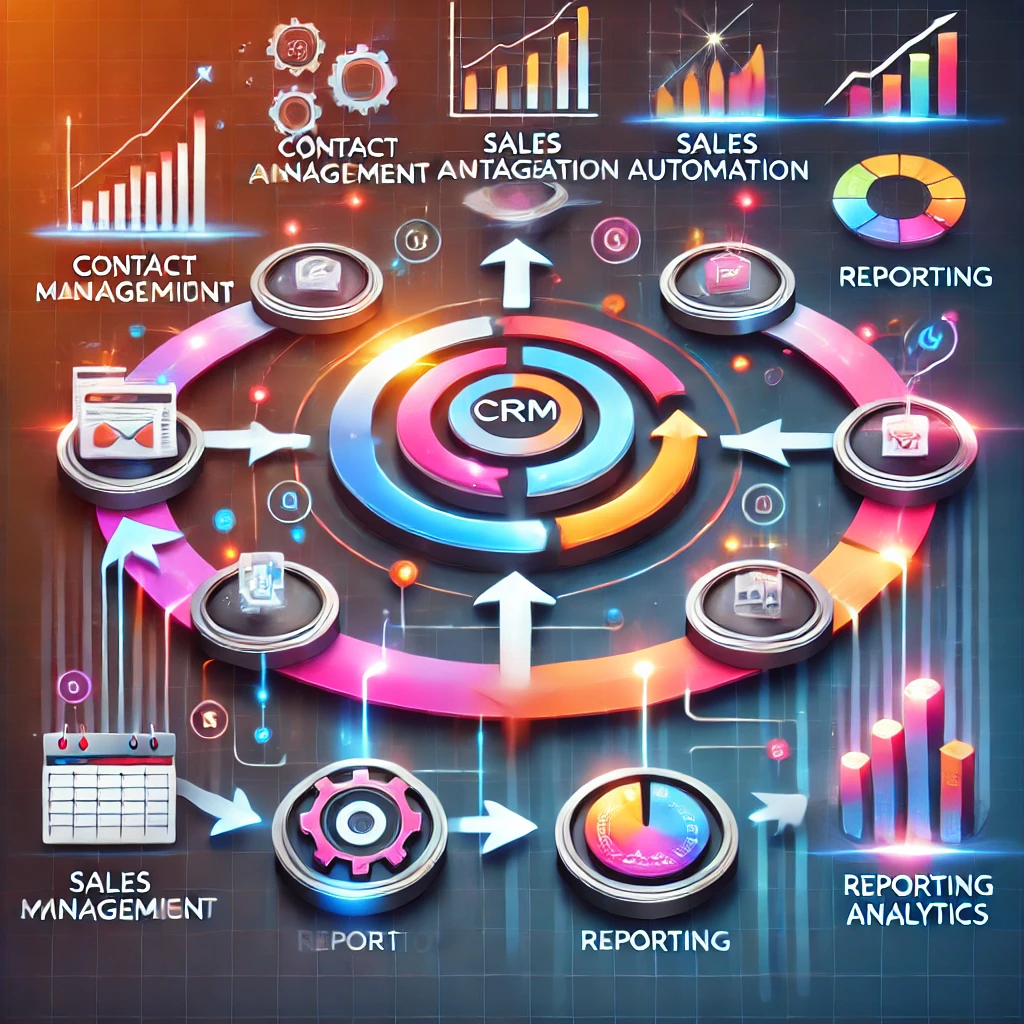
Other Recommendations Based on Specific Needs
- Zoho CRM: For budget-conscious businesses seeking AI-powered features and multi-channel support.
- Microsoft Dynamics 365: For businesses already using Microsoft Office and seeking ERP integration.
- Pipedrive: For sales teams focused on managing deals and pipelines effectively.
Why ManageEngine CRM+ Can Be a Strong Contender
If you want a well-rounded CRM solution that integrates IT management, ManageEngine CRM+ is worth considering. It offers:
- Unified Platform: Combines customer management with IT operations.
- Scalability: Flexible enough for growing businesses.
- Customization: Tailored features for specific industries.
Final Thoughts:
For small to medium-sized businesses, HubSpot CRM stands out for its simplicity, affordability, and marketing integration. For enterprises, Salesforce is the gold standard due to its customizability and advanced capabilities.
Evaluate your team's size, budget, and specific goals to choose the CRM software that best aligns with your needs. If you're unsure, start with free trials to explore features before making a decision.
Transform Your Business with Zoho CRM – Start Your 15-Day Free Trial Today!
In today’s competitive world, managing customer relationships effectively is key to driving growth and staying ahead. That’s why businesses like yours are turning to Zoho CRM, the ultimate tool to streamline your sales, marketing, and customer support processes.
Why Zoho CRM is Perfect for Your Business
- Centralized Customer Insights: Gain a 360-degree view of your customers to make informed decisions.
- Automated Workflows: Eliminate repetitive tasks and focus on what matters most—closing deals.
- Sales Forecasting: Accurately predict revenue and set realistic goals.
- Seamless Integrations: Integrates effortlessly with your favorite tools, including email platforms, analytics software, and more.
- Mobile Access: Manage your business on the go with Zoho CRM’s mobile app.
Whether you're a small business owner or managing a growing enterprise, Zoho CRM adapts to your needs, helping you save time, reduce costs, and enhance customer satisfaction.
Don’t Just Take Our Word for It
Thousands of businesses worldwide have already transformed their operations with Zoho CRM. Now, it’s your turn.
What’s the risk? Try it for 15 days free with no obligations. Discover firsthand how Zoho CRM can take your business to the next level.
Sign Up Now and Get Started
Click here to start your 15-day free trial today
Don’t wait—your competitors might already be ahead! Give your business the competitive edge it deserves with Zoho CRM.
Looking forward to seeing you onboard
Affiliate Disclosure
This article may contain affiliate links, which means we may earn a commission if you make a purchase or sign up for a service through one of our links. This comes at no additional cost to you and helps support the maintenance and creation of valuable content on this website.
We only recommend products and services that we genuinely believe will bring value to our readers. Our opinions and recommendations are unbiased and based on thorough research and expertise. Thank you for supporting us!



